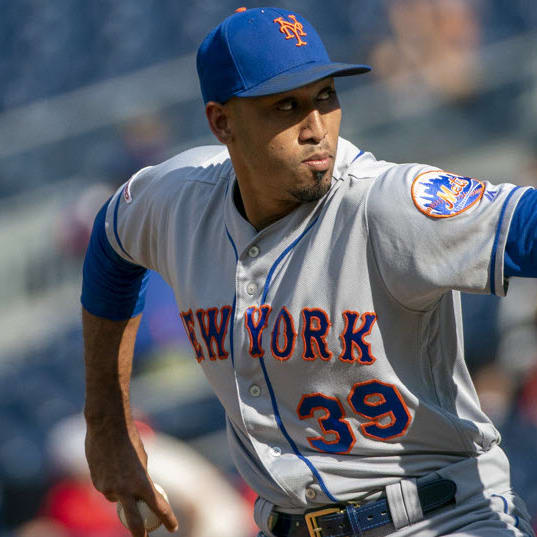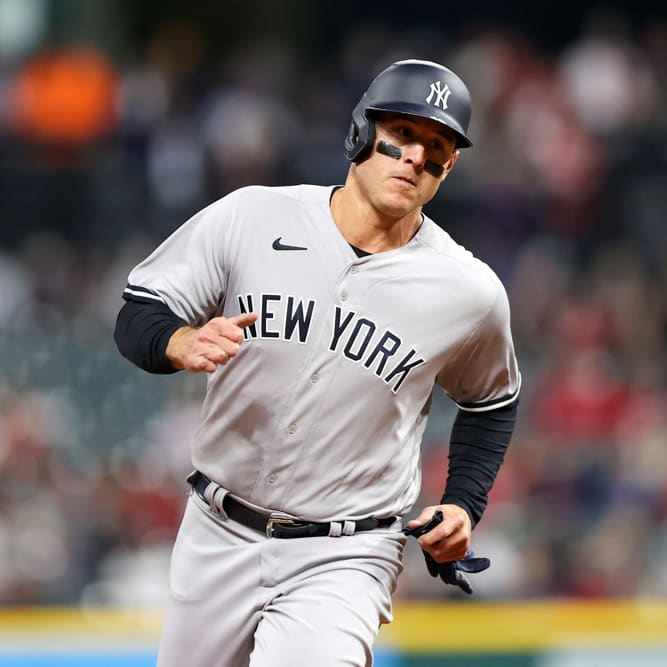This article is part of our Baseball Draft Kit series.
Winning a fantasy baseball league, much like hitting a baseball, is the hardest thing to do in fantasy sports. A primary contributor to this is the fact that unlike other fantasy sports (looking at you, football), there are few casual fantasy baseball players. Everyone plays fantasy football and thinks they can wake up and roll into a draft with their mad skills to pick a daily or season-long winner. That is not the case with baseball. There is luck in baseball, but luck is minimized over a 26-week season and a 162-game schedule. Those that play it are immersed in it. They are looking at the RotoWire news updates multiple times a day, tracking information as it breaks on Twitter and listening to radio shows and podcasts trying to catch tips before
Winning a fantasy baseball league, much like hitting a baseball, is the hardest thing to do in fantasy sports. A primary contributor to this is the fact that unlike other fantasy sports (looking at you, football), there are few casual fantasy baseball players. Everyone plays fantasy football and thinks they can wake up and roll into a draft with their mad skills to pick a daily or season-long winner. That is not the case with baseball. There is luck in baseball, but luck is minimized over a 26-week season and a 162-game schedule. Those that play it are immersed in it. They are looking at the RotoWire news updates multiple times a day, tracking information as it breaks on Twitter and listening to radio shows and podcasts trying to catch tips before their competition does.
When you are that invested in the players on your teams, it is only natural to get frustrated with them when they do not perform. We get angry with players when they do not perform at the level of their preseason projections for a few weeks, or in some cases, an entire season. You hear fantasy owners drop phrases such as "dead to me" or "not on my list" or make some joke about needing to scroll down the spreadsheet to find that player.
While that approach may offer some momentary relief from the frustration of previous relationships with a player, it can inflict fantasy wounds with surgical precision. You may end up missing out on players that come back with successful seasons following disastrous ones because you assumed that the player would just continue to underperform, forgetting that all growth, and failure, is not linear. Author James Clear refers to the gap between what you believe will happen between time and results and what actually happens as the "Valley of disappointment." In his book, he has a graph illustrating that valley and then a sharp upward curve of the line toward positive results after exiting the valley. Those are the players I attempt to help you find each season.
Normally I utilize this part of the column to show you the type of roster you could construct by shopping in the clearance bin of the previous year prices, but there was simply no value to use at catcher position because it is such a barren wasteland once you get through the first seven or eight spots. This year, here is the top 25 list of profits realized from players taken in the endgame:
| PLAYER | PAID* | EARNED | PROFIT |
| Scooter Gennett | $1 | $23 | $22 |
| Miguel Andujar | $0 | $22 | $22 |
| David Peralta | $1 | $21 | $20 |
| Michael Brantley | $1 | $21 | $20 |
| Mike Foltynewicz | $0 | $18 | $18 |
| Jhoulys Chacin | $0 | $18 | $18 |
| Patrick Corbin | $4 | $20 | $16 |
| Eddie Rosario | $3 | $19 | $16 |
| Stephen Piscotty | $2 | $17 | $15 |
| German Marquez | $0 | $13 | $13 |
| J.A. Happ | $3 | $15 | $12 |
| Charlie Morton | $4 | $16 | $12 |
| C.J. Cron | $0 | $12 | $12 |
| Matt Chapman | $3 | $15 | $12 |
| Zack Wheeler | $0 | $12 | $12 |
| Jose Martinez | $1 | $13 | $12 |
| Andrelton Simmons | $2 | $12 | $10 |
| Rick Porcello | $1 | $11 | $10 |
| Josh Hader | $2 | $12 | $10 |
| Tim Anderson | $6 | $15 | $9 |
| Gleyber Torres | $2 | $11 | $9 |
| Mallex Smith | $3 | $12 | $9 |
| Asdrubal Cabrera | $1 | $9 | $8 |
| Corey Dickerson | $0 | $8 | $8 |
| Brandon Nimmo | $0 | $6 | $6 |
*2018 Tout Wars Mixed Auction Cost
It would have cost $40 on draft day to accumulate this talent ($0 represents reserve round picks) and these 25 players amassed $371 of roto value in standard 12-team leagues. Much focus is put on the early part of the draft, but a very small percentage of players taken early in a draft return that kind of profit. The endgame, where the downtrodden, overlooked and uncertain await, is where most leagues are won or lost.
The purpose of this recurring article in this publication is to remind everyone that there is value in drafts and auctions, and some of it gets overlooked due to recency bias. That is what creates profit in your draft and auction.
There are a variety of reasons that these players are available at little or no cost in your auction. Some are recovering from injuries; some are coming off perceived fluke years or realistically awful years, others have landed in an unfortunate playing-time situation. In some cases, the player has no clear path to playing time during draft season due to crowded depth charts or rotations. Using those filters, let's seek out potential values for 2019 that should be cheap options to fill out your roster with the hope of earning a significant return on your investment.
REBOUND FROM INJURIES
Matt Shoemaker has had each of the past two seasons abbreviated due to forearm injuries. Neither necessitated the full TJ treatment, but his value has taken a considerable hit over the past two seasons. The landing spot in Toronto isn't great, but his 2018 skills once he came back were right in line with his 2016 numbers.
Jay Bruce suffered through both a hip injury and plantar fasciitis in 2018, proving once again a power hitter is nothing without his lower half. Now he gets to go to Seattle to potentially be the full-time DH and stay off the field assuming Jerry Dipoto trades Edwin Encarnacion away as he did Carlos Santana. Bruce has a run-production track record dressed in a heavy dose of recency bias.
Jeff Samardzija had been a workhorse on the mound until his shoulder screamed for time off last year. Yes, last year's numbers were a disaster but stare long and hard at the previous four seasons of skills and buy back in if you see him sinking in your drafts.
ROADBLOCKED
Ryan McMahon was a sleeper darling last year that remained asleep all season as he struggled to get into the lineup. He has the skills to be an above-average offensive threat and positional flexibility to get on the field. What he does not currently have is a starting job. Scouts grade his power with a 60 label, so if he can get a starting job in Coors Field, look out.
The Rays thought so much of Yandy Diaz that they gave up a player who was five years younger in Jake Bauers and an extra $5,000,000 to acquire the former Cuban refugee. Diaz is a Statcast darling who has one of the highest average exit velocities in the league, but also has one of the worst launch angles leading to wasted quality contact. Diaz has minor-league options left and the Rays have a crowded roster of flexible position types like Diaz, but few have the potential of his bat.
OTHER NAMES TO WATCH
Lance Lynn had a terrible overall year in 2018, two years removed from his TJ surgery, but hidden within those bad numbers was some rather excellent pitching out of the bullpen for the Yankees once they acquired him at the trade deadline. The Rangers saw enough in him to give him a three-year deal, so if he can get back to his pre-surgery command, he could be a bargain in the endgame with his strikeout rate. The home park is bit of a concern, but it's a risk worth taking for 180-plus strikeouts.
Adam Duvall followed up consecutive 30-homer seasons with a stinkbomb of a 2018 season that saw him traded and relegated to a bench role. His numbers against lefties plummeted after consecutive seasons of above-average production against them, and Statcast data shows Duvall's contact deserved better results than he achieved in 2018. Thirty homers may be out of reach, but would any of us be upset at something in the 20s that is likely freely available late in drafts?
The last time we saw Ryan Madson, he was having some issues in the World Series. He is a free agent at press time, and has but three seasons with at least 10 saves to his name, but he is the perfect candidate to land somewhere on the cheap and add a fourth season to that record. He still sports an above-average strikeout rate for a reliever, and was dealing with back and leg issues last year that impacted his command. He isn't as great as he was in 2017 nor is he as bad as he was in 2018, and could easily close for a second-division team and pick up 20 saves before being traded at the deadline.
Jake Odorizzi's 4.49 ERA and 1.34 WHIP from 2018 should sufficiently suppress his draft-day cost. His issues last year were driven by Paul Molitor ignoring the times-through-the-order penalty and allowing his pitcher to stay out there longer than he should. Odorizzi had a 11.44 ERA and allowed 12 home runs when allowed to face hitters a third time in a game. Enter new manager Rocco Baldelli who learned in Tampa Bay how to limit the TTOP damage watching Kevin Cash use either an opener or a quick hook. Odorizzi will lose some strikeouts under Baldelli's management, but his ratios will be better for it.
This article appears in the 2019 RotoWire Fantasy Baseball Guide. You can order a copy here.










